|
|
|
Sort Order |
|
|
|
Items / Page
|
|
|
|
|
|
|
| Srl | Item |
| 1 |
ID:
068788
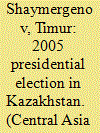

|
|
|
| 2 |
ID:
178469


|
|
|
|
|
| Summary/Abstract |
Uzbekistan and Kazakhstan have new leaders for the first time since 1989: Shavkat Mirziyoyev as Uzbek president and Kassym-Jomart Tokayev as Kazakh president. This article uses a theoretical framework based on the literatures of leadership change and political succession while overlaying this literature with the type of economic policies followed by each former leader to analyse the political and economic transitions in these countries. Mirziyoyev has legitimized his authority, even though he was not part of the elite, through reforms designed to help the people (as Karimov had envisioned in the ‘Uzbek way’). In contrast, Nazarbayev’s policies were centred around the state as a facilitator of economic development, a problem for citizens in an economic downturn. While Tokayev transitioned through a formal electoral process, his was a ‘managed’ designation, with the charismatic leader still in a formal position of power, leaving Tokayev without a separate base of legitimacy.
|
|
|
|
|
|
|
|
|
|
|
|
|
|
|
|
| 3 |
ID:
186633
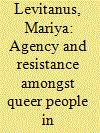

|
|
|
|
|
| Summary/Abstract |
This article focuses on the everyday lives of queer people in Kazakhstan, exploring how they express agentic power and negotiate their queer identity. This research is based on a Foucauldian-informed narrative analysis of in-depth interviews with 11 people who identify as queer and live in Kazakhstan. Findings show that the choice and ability to regulate one’s visibility are crucial expressions of queer agency and resistance. This paper expands on previously published research on gender and sexuality in Central Asia by focusing beyond the issues of violation of human rights and the difficult experiences of queer people, by considering instances of acceptance, support and positive experiences alongside experiences of homophobia, transphobia and discrimination.
|
|
|
|
|
|
|
|
|
|
|
|
|
|
|
|
| 4 |
ID:
079871
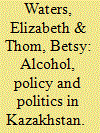

|
|
|
|
|
| Publication |
2007.
|
| Summary/Abstract |
Alcohol consumption in post-communist Kazakhstan remains at high levels and episodic heavy drinking, characteristic of the spirits-drinking regions of the former USSR, is still the national drinking style. Reported levels of alcohol-related harm are rising but assessment of trends in levels of consumption and harm is hindered by the disruption to data collection in the post-independence period and the continuing poor availability of public information. There is evidence however that changes in the republic's ethnic profile are connected with a downward trend in overall consumption rates, though changes in lifestyles may be leading to more drinking amongst women and young people. The numbers undergoing treatment for alcohol problems are greater than ever before. Alcohol problems are still perceived as entrenched and non-urgent, but in the present climate of greater stability and prosperity they are beginning to attract more attention from government. Underlying policy trends will depend on the overall direction of Kazakhstan's political and cultural development. This article assesses drinking patterns and related problems in Kazakhstan, and examines government responses and policies. The article is based on documentary research, visits to organisations and interviews
|
|
|
|
|
|
|
|
|
|
|
|
|
|
|
|
| 5 |
ID:
193550
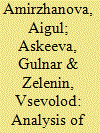

|
|
|
|
|
| Summary/Abstract |
This study conducts a comparative analysis of Ukraine and the Republic of Kazakhstan, two post-Soviet states facing ongoing contradictions and challenges in mutual understanding. Following the collapse of the Soviet Union, these states embarked on their own paths of national development, influenced by various political, economic, socio-cultural, and ethnic factors. This study examines the formation of political parties, the development of political and electoral culture, and the legal approaches to organizing the electoral process in Ukraine and Kazakhstan. Additionally, it explores the manipulation of electoral behavior through a specific case study. The study employs standard political research methods such as comparative analysis, anthropological and structural-functional approaches, content analysis, and a systematic approach. The findings of this study serve as valuable information for experts involved in organizing electoral processes, researchers in comparative political science, and readers interested in the subject matter.
|
|
|
|
|
|
|
|
|
|
|
|
|
|
|
|
| 6 |
ID:
097895


|
|
|
| 7 |
ID:
076016
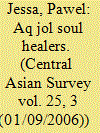

|
|
|
| 8 |
ID:
187620
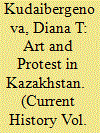

|
|
|
|
|
| Summary/Abstract |
Recent events in Kazakhstan show that political art has the potential to be a potent form of protest in some of the most authoritarian states in contemporary Central Asia. After the collapse of the Soviet Union, artists in Kazakhstan and elsewhere in the region began turning away from the canon of Socialist Realist art, with its sole aim of serving the regime and depicting its visions of the future. New forms of contemporary art emerged, drawing sharp contrasts with official art in form, content, and culture, as more artists insisted on freedom from state patronage and control. In the political upheaval following the resignation of long-ruling President Nursultan Nazarbayev, artists have inspired protests with pointed critiques.
|
|
|
|
|
|
|
|
|
|
|
|
|
|
|
|
| 9 |
ID:
149735
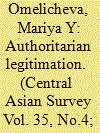

|
|
|
|
|
| Summary/Abstract |
What are the sources of authoritarian persistence in Central Asia? This study explores the argument that authoritarian regimes persist through effective authoritarian legitimation. Drawing on the theory and analysis of discourse, it develops an approach to authoritarian legitimation and examines discursive appeals to legitimacy by the Kazakh and Uzbek presidents. The study also assesses the effectiveness of the presidential discourses of legitimacy for public perception of the governing regimes in Kazakhstan and Uzbekistan. This research shows that by defining what constitutes legitimate power and presenting political rule as consistent with this definition, authoritarian governments can foster certain modes of reasoning and evaluation among citizens, and create possibilities for their acceptance of the regime as ‘right’ or ‘proper’.
|
|
|
|
|
|
|
|
|
|
|
|
|
|
|
|
| 10 |
ID:
067356
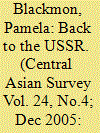

|
|
|
| 11 |
ID:
152058
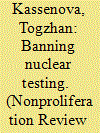

|
|
|
|
|
| Summary/Abstract |
In the late 1940s, the Soviet Union rushed to build and test its first nuclear bomb to reach parity with the United States. The Soviet government chose the steppes of Kazakhstan as its first nuclear-testing site. In difficult conditions, weapons program participants built the site and, in 1949, tested the first Soviet nuclear bomb. Shrouded in secrecy, the Soviet military complex continued to conduct nuclear tests in Kazakhstan for forty years while the local population became an unwilling victim of the Soviet nuclear might. Nuclear tests, especially during the earlier years of atmospheric testing, resulted in severe health and environmental consequences for thousands of nearby residents. Mass protests in Kazakhstan against nuclear tests built the momentum that drove the Kazakh government's decision to close down the Semipalatinsk nuclear-testing site in 1989. Organized public movement against nuclear testing became an important part of Kazakhstan’s nation-building process. Since closing down the site, Kazakhstan has prioritized nuclear disarmament and nonproliferation, using its tragic nuclear past as a platform for making meaningful contributions to international security. Kazakhstan now offers the former nuclear-test site at Semipalatinsk for exercises designed to strengthen the verification capacity of the Comprehensive Nuclear-Test-Ban Treaty (CTBT). The country also plays a leading role in promoting CTBT entry into force.
|
|
|
|
|
|
|
|
|
|
|
|
|
|
|
|
| 12 |
ID:
091594
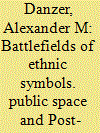

|
|
|
|
|
| Publication |
2009.
|
| Summary/Abstract |
This article provides an analysis of interdependencies between post-Soviet Erinnerungspolitik in public space and the individual perception of urban reconfigurations by ethnic Germans in Kazakhstan. Applying a qualitative social-geographic approach the author examines determinants of the process of ethnic symbolisation of real and imagined places. Individual biography and the extent of Soviet socialisation are factors shaping the personal perception of symbolic landscapes. From the perspective of the individual, space reflects the power distribution within society and hence, impacts on individual identity formation. Depending on the dominance of internal as opposed to external identification, the (perceived) changing ethnicised landscape of cities potentially fuels ethnic tension.
|
|
|
|
|
|
|
|
|
|
|
|
|
|
|
|
| 13 |
ID:
171128
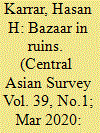

|
|
|
|
|
| Summary/Abstract |
Since 2013, there have been multiple fires in bazaars in Almaty, Kazakhstan. Most of these fires have occurred in Barakholka, the largest bazaar in Central Asia, known for wholesaling in apparel, shoes and low-quality household and office supplies. Ownership of Barakholka is opaque. Using recurrent Barakholka fires as my point of departure, this article contributes to scholarship by describing how the clearing of old bazaars is followed by new property developments and the imposition of new rent regimes. In doing so, I argue that fire – a form of ruination that not only destroys property but also severs networks and people's relationship to a place – is illustrative of how the bazaar, as a new institution within an emerging post-Soviet market economy, was moulded by private interests, and repeated, often ruinous assertions of control over property. I also argue that this process was embedded in a larger political economy that sought to ‘civilize’ the earlier marketplaces. This article is based on ethnographic interviews and repeated visits to the Barakhola between 2016 and 2018, and media accounts of the fires.
|
|
|
|
|
|
|
|
|
|
|
|
|
|
|
|
| 14 |
ID:
188302


|
|
|
|
|
| Summary/Abstract |
Following the 2014 Ukraine crisis, Belarus and Kazakhstan appear caught in an alliance security dilemma characterised by intra-alliance threat and entrapment, as both are potential targets of militarised hybrid warfare by their vastly more powerful ally, Russia. Despite having sought foreign policy flexibility between the two increasingly opposed geopolitical camps of the West and Russia, Minsk and Nur-Sultan appear drawn further towards Moscow. Utilising their pre- and post-2014 national security documents, reinforced by an examination of their rhetoric and policies, this essay demonstrates how both countries reassessed their security environment in the wake of the annexation of Crimea and the initial war in the Donbas region.
|
|
|
|
|
|
|
|
|
|
|
|
|
|
|
|
| 15 |
ID:
178213


|
|
|
|
|
| Summary/Abstract |
The Russian-led Eurasian Economic Union (EAEU) is a key partner in China’s Belt, and Road Initiative (BRI), since it comprises the majority of territories which the BRI’s overland route, the Silk Road Economic Belt, needs to traverse as it crosses Central Asia on the way to Europe. The goal of this article is to explore the BRI in the context of BRI–EAEU coordination. The first part of the analysis focusses on the ways the Eurasian Economic Commission delineates the “Greater Eurasian Partnership” and counterposes it against China and the BRI. Then, the article compares two sets of interpretations of the BRI and “Greater Eurasian Partnership” obtained from interviews with elites in Kazakhstan and Russia. The interviews indicate that the BRI has had a much more forceful impact on local elites than Russia’s idea of “Greater Eurasian Partnership.”
|
|
|
|
|
|
|
|
|
|
|
|
|
|
|
|
| 16 |
ID:
147197
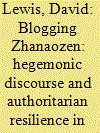

|
|
|
|
|
| Summary/Abstract |
Post-Soviet authoritarian regimes – particularly in Central Asia – have proved highly resilient since independence. Existing explanations for regime longevity should be augmented by consideration of non-material, discursive sources of political legitimacy. A robust authoritarian regime requires the production and circulation of a hegemonic discourse that is internalized by influential social groups. This type of dominant discourse has emerged in Kazakhstan, making it difficult for political opponents to promote alternative political imaginaries and mobilize popular support. State control over media is challenged by Internet-based platforms, but in Kazakhstan social media and blogging have also offered an opportunity for the regime to reproduce its own hegemonic discourse. This article uses a discourse analysis of posts by bloggers in the aftermath of a violent conflict in Zhanaozen in Kazakhstan in 2011 to demonstrate how central elements in the state discourse are reproduced online, even by independent bloggers, suggesting that an official discourse has the ability to maintain its hegemonic status despite widespread use of blogs and social media.
|
|
|
|
|
|
|
|
|
|
|
|
|
|
|
|
| 17 |
ID:
137229
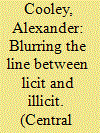

|
|
|
|
|
| Summary/Abstract |
The anti-corruption norm in both scholarship and the policy world has too narrowly focused on the domestic and institutional context of bribe-taking and public corruption. Instead, we argue that corruption in the contemporary global economy requires a multiple set of connected transactions, processes, and relationships that take place within informal transnational networks that blur the line between illegal and legal activities. These networks include multinational companies, elites in host countries, offshore financial vehicles and conduits, middlemen and brokers, and destination financial institutions. We examine how these actors operate in Central Asia, a region that is widely identified as corrupt, yet is rarely understood as embedded in the types of global processes, offshore connections and transnational links specified in our analysis. Examples of offshore centers in tax planning from Central Asia, and partial results from a field experiment based on impersonating high corruption risks from four Central Asian states, provide evidence for how the various actors in transnational financial networks structure their dealings. We then present two brief illustrative cases of how these transnational networks have operated in energy explorations services in Kazakhstan and telecommunications contracts in Uzbekistan. Our findings have theoretical, practical, and normative implications for scholars and practitioners of Central Asian international political economy and other ‘high risk' regions.
|
|
|
|
|
|
|
|
|
|
|
|
|
|
|
|
| 18 |
ID:
168831
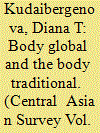

|
|
|
|
|
| Summary/Abstract |
What is the power of social media in defining and policing sexual identities and bodily expressions, and what are their connections to understanding nation, power and self in authoritarian contexts? Through the study of popular Instagram accounts in Kazakhstan and Russia, I argue that these sites serve as spaces of visualization and re-creation of new forms of ‘acceptable’ behaviour and lifestyles, that on the one hand may lead to new globalized visions of sexual identity and the body while on the other promoting localized conflict and resentment online, triggered by online users’ fear of losing their ‘national culture’ in these global trends. While many resort to policing gender norms and heteronormative body images online, influencers and Instagrammers from Russia and Kazakhstan take an active part in resisting these frameworks and categories.
|
|
|
|
|
|
|
|
|
|
|
|
|
|
|
|
| 19 |
ID:
060927
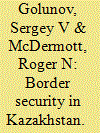

|
|
|
| 20 |
ID:
016552
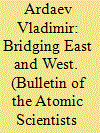

|
|
|
|
|
| Publication |
Oct 1993.
|
| Description |
24-29
|
|
|
|
|
|
|
|
|
|
|
|
|
|
|
|
|
|
|
|
|